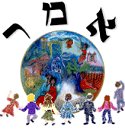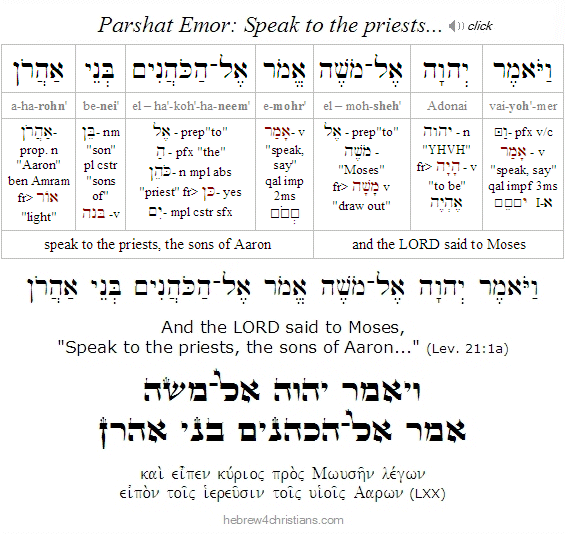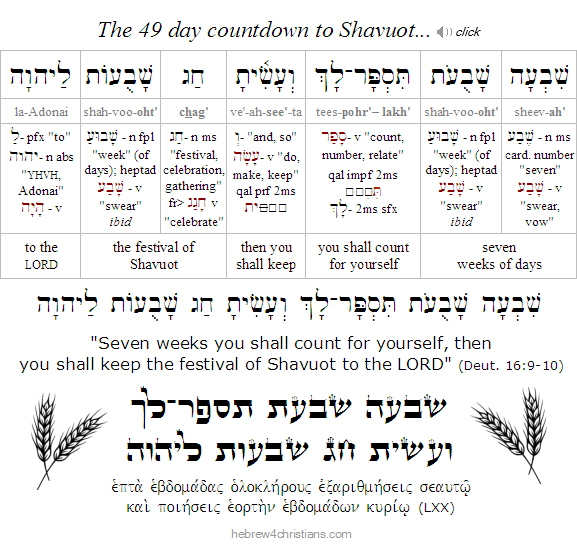|
|
 |
 |
|
Click on the Parashah name to read the summary:
|
 |
 |
|
Monday, May 13th at sundown:
|
|
|
 |
 |
|
The date for Yom Ha'atzmaut can vary from year to year. For instance, this year it is moved a day later (i.e., to Iyyar 6th) so that it will not conflict with the weekly Sabbath. On our secular calendar Israel's Independence Day is therefore observed Mon. May 13th at sundown, running until the following sundown on May 14th...
|
|
 |
 |
|
Note that the word Atzma'i (עַצְמָאִי) means "independent" in Hebrew. The word atzmaut (עַצְמָאוּת) means the state of indepedence, which comes from atzmi - "my bones" (עֶצֶם). Hence the "Day of Independence" is called Yom Ha'atzmaut in Hebrew. The name reminds us of God's promise to revive the "dry bones" (עֲצָמוֹת) of Israel by bringing the Jewish people back from their long exile (Ezek. 37:4-5).
עַם יִשְׂרָאֵל חַי / am Yisrael chai: "The people of Israel live!" The nation of Israel is God's "super sign" that He is faithful to His covenant promises (Jer. 31:35-37). Celebrating Israel's independence acknowledges God's loyal love for us all.
|
 |
 |
|
Parashat Emor: God's Appointed Times
|
 |
 |
|
Our Torah portion for this week (parashat Emor) lists the eight main holidays revealed in the Jewish Scriptures. In the Torah, these "holidays" are called "appointed times" (i.e., mo'edim: מוֹעֲדִים), a word which comes from the Hebrew root meaning witness (עֵד). Other words formed from this root include edah (עֵדָה), a congregation, edut (עֵדוּת), a testimony, and so on. The related verb ya'ad (יָעַד) means to meet, assemble, or even to betroth. The significance of the holy days, then, is for the covenant people of the LORD to bear witness to God's love and faithfulness.
|
|
|
 |
 |
|
"Speak to the people of Israel and say to them, 'These are the appointed times of the LORD (מוֹעֲדֵי יְהוָה) that you shall proclaim as holy convocations (מִקְרָאֵי קדֶשׁ); they are My appointed times'" (Lev. 23:2). Note that these hallowed times - the very first of which is the weekly Sabbath - are "of the LORD," and that means they should be regarded as appointments given by God Himself to help draw us closer to Him, to reveal His prophetic truth, and to remind ourselves of His great plan for our lives. God did not give us the Torah in vain, friends, neither does He speak out of two sides of his his mouth... Yeshua was the Voice of the LORD speaking the words of Torah to Israel at Sinai, and therefore every "jot and tittle" (קוֹצוֹ שֶׁל יוֹד) is indeed relevant to our lives as his followers (Matt. 5:18-19).
|
 |
 |
|
Theodor Herzl Day - May 19th
|
 |
 |
|
Herzl Day (i.e., Yom Herztl: יום הרצל) was established by the Israeli Knesset to commemorate the achievements and Zionist vision of Theodor Herzl (1860-1904), considered by many to be the father of the modern State of Israel. Herzl Day is observed on Theodor Herzl's birthday (Iyyar 10th) unless that day happens to fall on a Sabbath, in which case it will be postponed until the following day.
|
|
|
 |
 |
|
Herzl Day is commemorated by a state memorial service held on Mount Herzl in Jerusalem, the site of Israel's national cemetery. As the father of modern Zionism, Herzl's tomb is located at the top of the hill. His memorial faces the Mount of Olives from a distance. In addition to the burial site of Theodor Herzl, many great leaders of the Modern State of Israel are buried there as well. For this reason Mount Herzl is the venue for many commemorative events and national celebrations.
This year Herzl Day will be observed Sunday, May 19th.
|
 |
 |
|
May 21st: "Second Chance" Passover
|
 |
 |
|
Passover is the only festival that the LORD our God made special provision so that if someone missed the occasion (on account of illness, ritual impurity, or some other valid reason), he or she could make it up 30 days later on Iyyar 14 (see Num. 9:9-12). This "second chance" Passover is called Pesach Sheni (פֶּסַח שֵׁנִי) or Pesach Katan ("little Passover"), the seder of which is observed under the full moon of Iyyar 15 (which this year falls on Tuesday, May 21st at sundown). Among the ultra-orthodox, it has become customary to eat some leftover matzah on this date to commemorate the holiday.
Passover Seder Guide
|
 |
 |
|
Counting the Omer - ספירת העומר
|
 |
 |
|
We are in the midst of Sefirat Ha-Omer (the "Counting of the Omer"), a 49 day countdown that runs from Nisan 16 through Sivan 5. The first day of the omer count begins on the second day of Passover, and the last day occurs the day before Shavuot ("Pentecost"). On our Gregorian calendars, these dates run from Saturday, Tuesday April 23rd [eve] to Monday June 10th this year. This is a "countdown period" leading to the giving of the Torah at Sinai and the giving of the Holy Spirit to Yeshua's disciples...
|
 |
 |
 |
 |
 |
 |
 |
 |
|
 |
 |
 |
 |
 |
 |
 |
 |
|
Blessing before Torah Study:
|
|
|
|
 |
|
|
|
 |
|
|
|
Some terms:
|
|
|
|
- Parashah is the weekly Scripture portion taken from the Torah. Each parashah is given a name and is usually referred to as "parashat - name" (e.g., parashat Noach). For more information about weekly readings, click here.
- Aliyot refer to a smaller sections of the weekly parashah that are assigned to people of the congregation for public reading during the Torah Reading service. In most congregations it is customary for the person "called up" to recite a blessing for the Torah before and after the assigned section is recited by the cantor. For Shabbat services, there are seven aliyot (and a concluding portion called a maftir). The person who is called to make aliyah is referred to as an oleh (olah, if female).
- Maftir refers to the last Torah aliyah of the Torah chanting service (normally a brief repetition of the 7th aliyah, though on holidays the Maftir portion usually focuses on the Holiday as described in the Torah). The person who recites the Maftir blessing also recites the blessing over the Haftarah portion.
- Haftarah refers to an additional portion from the Nevi'im (Prophets) read after the weekly Torah portion. The person who made the maftir blessing also recites the blessing for the Haftarah, and may even read the Haftarah before the congregation.
- Brit Chadashah refers to New Testament readings which are added to the traditional Torah Reading cycle. Often blessings over the Brit Chadashah are recited before and after the readings.
- Mei Ketuvim refers to a portion read from the Ketuvim, or writings in the Tanakh. Readings from the Ketuvim are usually reserved for Jewish holidays at the synagogue.
- Perek Yomi Tehillim refers to the daily portion of psalms (mizmorim) recited so that the entire book of Psalms (Tehillim) is read through in a month. For a schedule, of daily Psalm readings, click here.
- Gelilah refers to the tying up and covering the Sefer Torah (Torah Scroll) as an honor in the synagogue.
- Divrei Torah ("words of Torah") refers to a commentary, a sermon, or devotional on the Torah portion of the week.
|
|
|
|
 |
|
|
|
Related Topics:
|
|
|
|
|
|
|
<< Return
|
|
|
|
Hebrew for Christians
Copyright © John J. Parsons
All rights reserved.
|
|
|
|
 |
|
|
|
|
|
|












